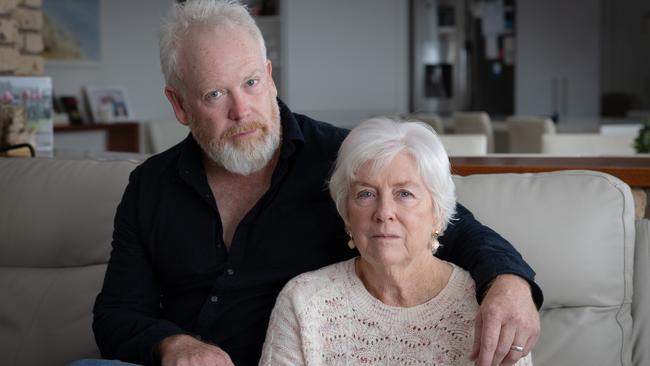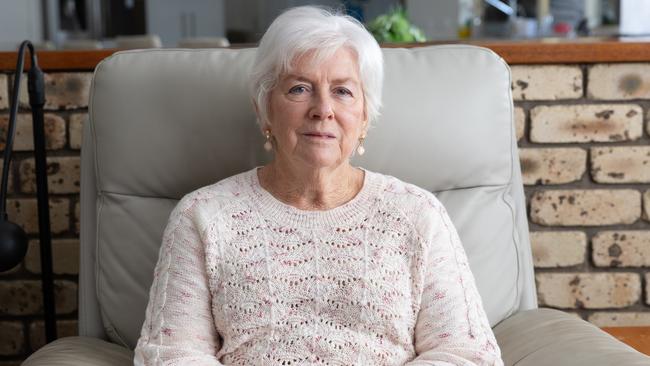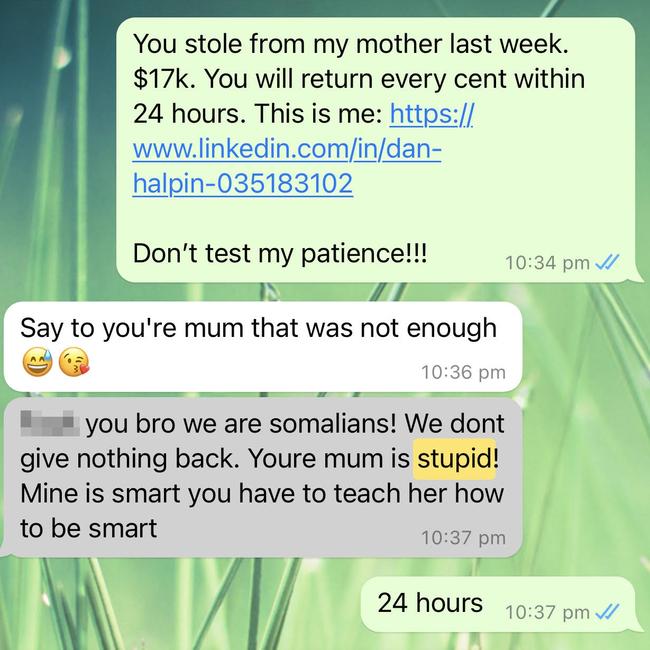Scams Australia: The `Hi Mum’ message, and what it exposes about police, banks
Gwen Halpin lost money to a notorious phone scam, but it was the police and banking response that was truly shocking.

Gwen Halpin and her husband were about to pick up an elderly relative from a nursing home when a mobile phone message pinged from a number they didn’t recognise.
“Hi Mum,” it began.
The message and others that followed in quick succession explained it was their son, and that he’d lost his phone and needed urgent help paying some bills.
Distracted by the nursing home trip, but happy to lend a hand in a crisis, Ms Halpin within minutes made two bank transfers totalling $17,375 to a PayID.
It was only when there was pressure for a third payment that she realised it didn’t sound like the way her son talked to her.
“That’s when it twigged – it wasn’t him,” she said.
Usually, scams like this remain hidden, the victims too wounded or embarrassed to talk about it.
But with Australians under siege from phone scams, Gwen, 71, is speaking up to help others avoid the same trap, and because of the deficiencies exposed in the response of police and banks.

The Halpins suspect that the handling of their case highlights a wider problem – an alarming lack of effort in Australia in stopping and investigating scams, as annual losses of billions of dollars cause severe financial and emotional damage.
Ms Halpin’s son, Dan Halpin, happens to be a private cyber-fraud investigator. He was in the Netherlands when his mum was targeted by the notorious scam.
More than 11,000 people were caught out by the same scam last year, with 90 per cent of losses reported by people over the age of 55, Australian Competition and Consumer Commission figures show.
When Ms Halpin called her son in a panic about what had just happened, he told her: “You do realise it’s night time here, I’ve been asleep not sending you messages – you should know I don’t need your money!”
Ms Halpin is from NSW but asked The Australian to withhold her exact location.
She reported the crime to the NSW Police Force on the day it happened, Tuesday, September 20, last year. By then, her son had used the offender’s PayID to confirm a suspect’s name, South Australian bank account, email address and phone number.
But a NSW Police event report, obtained through right to information laws, states: “Do you have a suspect: No.” The Halpins say this is incorrect.
“I told (a policewoman) that my son was a cyber fraud investigator, and he had provided me with the bank details of this scammer, in Australia, and the name,” Ms Halpin said.
“She said, ‘oh that information’s got no credibility’. I told her the information anyway.”
The event report also appears to contradict itself, listing details for the suspect’s name, Commonwealth Bank account and branch in the Armada Arndale Shopping Centre in Adelaide.
On October 5, less than three weeks after the scam was reported, NSW Police updated the incident status to “no further investigation”, the report shows.
The reason given was: “All reasonable inquiries completed.”
Ms Halpin said she had not received an update and there was no evidence of any other investigations. “They didn’t even contact me to get a formal statement,” she said.
Mr Halpin, chief executive of Cybertrace, said he took from the police event report that the investigation was effectively closed.
The suspect he provided was either responsible for the scam messages, or his bank account was being used by the scammers and should have provided avenues for police to investigate.
The account could have been used to defraud others, he said.

“I tracked him to Adelaide and located his Facebook account. He’s only a young guy,” Mr Halpin said. “The fact they didn’t take a formal statement (from his mum) shows they had no intention of investigating.”
NSW Police declined to answer nine questions from The Australian about actions it had taken, but issued a brief statement saying “investigations into the incident are continuing”.
Ms Halpin’s bank, ANZ, let the payments go through despite them involving, for her, significant and unusual sums of money being paid to an account she had never previously used.
After the second transfer, the bank initiated a block on her account, she said.
At that point Ms Halpin still believed she was communicating with her son, and asked for the account to be unlocked.
Fortunately, before losing more money, the truth had dawned on her.
She says she called the bank back immediately to report the scam, was cut off and then waited on the phone for two hours.
“I was beside myself at this stage. I just wanted them to stop that payment going through but I couldn’t get to them. I was very disappointed that they didn’t stop it,” she said.
ANZ has since told her there is no way to get the money back.
ANZ does not discuss specific customers, but customer protection head Shaq Johnson said the bank “regularly reviews its prevention controls”.
Australians lost a record $3.1bn to scams in 2022, up 80 per cent on the previous year, according to the ACCC.
ACCC deputy chairwoman Catriona Lowe said in April that this included “an explosion in reported losses to phishing scams in the past year, such as “Hi Mum” and Toll/Linkt text scams, which skyrocketed by 469 per cent to $24.6m in 2022”.






To join the conversation, please log in. Don't have an account? Register
Join the conversation, you are commenting as Logout